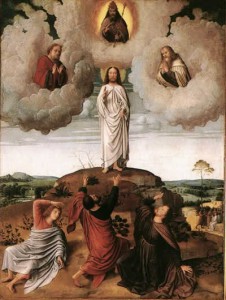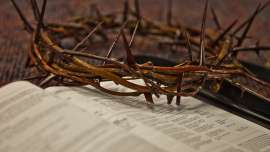
The Glory in Sight
In today’s Gospel, we go up to the mountain with Peter, John and James. There we see Jesus “transfigured,” speaking with Moses and Elijah about His “exodus.” The Greek word “exodus” means “departure.” But the word is chosen deliberately here to stir our remembrance of the Israelites’ flight from Egypt. By His death and resurrection, Jesus will lead a new Exodus—liberating not only Israel but every race and people; not from bondage to Pharaoh, but from slavery to sin and death. He will lead all mankind, not to the territory promised to Abraham in today’s First Reading, but to the heavenly commonwealth that Paul describes in today’s Epistle. Moses, the giver of God’s law, and the great prophet Elijah, were the only Old Testament figures to hear the voice and see the glory of God atop a mountain (see Exodus 24:15-18; 1 Kings 19:8-18). Today’s scene closely resembles God’s revelation to Moses, who also brought along three companions and whose face also shone brilliantly (see Exodus 24:1; 34:29). But when the divine cloud departs in today’s Gospel, Moses and Elijah are gone. Only Jesus remains. He has revealed the glory of the Trinity—the voice of the Father, the glorified Son, and the Spirit in the shining cloud. Jesus fulfills all that Moses and the prophets had come to teach and show us about God (see Luke 24:27). He is the “chosen One” promised by Isaiah (see Isaiah 42:1; Luke 23:35), the “prophet like me” that Moses had promised (see Deuteronomy 18:15; Acts 3:22-23; 7:37). Far and above that, He is the Son of God (see Psalm 2:7; Luke 3:21-23). ”Listen to Him,”the Voice tells us from the cloud. If, like Abraham, we put our faith in His words, one day we too will be delivered into “the land of the living” that we sing of in today’s Psalm. We will share in His resurrection, as Paul promises, our lowly bodies glorified like His.
Pope Benedict XVI
Angelus Address, March 4, 2007
On the Second Sunday of Lent, the Evangelist Luke emphasizes that Jesus went up on the mountain “to pray” (9:28), together with the Apostles Peter, James and John, and it was “while he prayed” (9: 29) that the luminous mystery of his Transfiguration occurred.
Thus, for the three Apostles, going up the mountain meant being involved in the prayer of Jesus, who frequently withdrew in prayer especially at dawn and after sunset, and sometimes all night. However, this was the only time, on the mountain, that he chose to reveal to his friends the inner light that filled him when he prayed: his face, we read in the Gospel, shone and his clothes were radiant with the splendour of the divine Person of the Incarnate Word (cf. Lk 9:29).
There is another detail proper to St Luke’s narrative which deserves emphasis: the mention of the topic of Jesus’ conversation with Moses and Elijah, who appeared beside him when he was transfigured. As the Evangelist tells us, they “talked with him… and spoke of his departure” (in Greek, éxodos), “which he was to accomplish at Jerusalem” (9:31).
Therefore, Jesus listens to the Law and the Prophets who spoke to him about his death and Resurrection. In his intimate dialogue with the Father, he did not depart from history, he did not flee the mission for which he came into the world, although he knew that to attain glory he would have to pass through the Cross.
On the contrary, Christ enters more deeply into this mission, adhering with all his being to the Father’s will; he shows us that true prayer consists precisely in uniting our will with that of God. For a Christian, therefore, to pray is not to evade reality and the responsibilities it brings but rather, to fully assume them, trusting in the faithful and inexhaustible love of the Lord.
For this reason, the verification of the Transfiguration is, paradoxically, the Agony in Gethsemane (cf. Lk 22:39-46). With his impending Passion, Jesus was to feel mortal anguish and entrust himself to the divine will; his prayer at that moment would become a pledge of salvation for us all.
Indeed, Christ was to implore the Heavenly Father “to free him from death” and, as the author of the Letter to the Hebrews wrote: “he was heard for his godly fear” (5:7). The Resurrection is proof that he was heard.
Dear brothers and sisters, prayer is not an accessory or “optional”, but a question of life or death. In fact, only those who pray, in other words, who entrust themselves to God with filial love, can enter eternal life, which is God himself.
During this Season of Lent, let us ask Mary, Mother of the Incarnate Word and Teacher of the spiritual life, to teach us to pray as her Son did so that our life may be transformed by the light of his presence.
Pope Benedict XVI
Angelus Address, February 24, 2013
Dear Brothers and Sisters,
Thank you for your affection!
Today, the Second Sunday of Lent, we have a particularly beautiful Gospel, that of the Transfiguration of the Lord. Luke the Evangelist highlights in particular the fact that Jesus was transfigured while he was praying. Jesus experienced a profound relationship with the Father during a sort of spiritual retreat which he made on a high mountain in the company of Peter, James and John, the three disciples ever present at the moments of the Teacher’s divine manifestation (Lk 5:10; 8:51; 9:28).
The Lord, who had just foretold his death and Resurrection (9:22), granted the disciples a foretaste of his glory. And the heavenly Father’s voice rang out in the Transfiguration, as in the baptism: “this is my Son, my Chosen; listen to him!” (9:35). Moreover the presence of Moses and Elijah, who represent the Law and the Prophets of the Old Covenant, is particularly significant: the whole history of the Covenant is oriented to him, Christ, who makes a new “exodus” (9:31), not toward the promised land, as in the time of Moses, but toward Heaven.
Peter’s words “Master, it is well that we are here” represent the impossible attempt to put this mystical experience on hold. St Augustine commented: “[Peter]… on the mountain… had Christ as the food of his soul. Why should he have to go down to return to his hard work and sorrows while up there he was filled with sentiments of holy love for God and which thus inspired in him a holy conduct? (Sermon 78,3: pl 38, 491).
In meditating on this passage of the Gospel, we can learn a very important lesson from it: first of all, the primacy of prayer, without which the entire commitment to the apostolate and to charity is reduced to activism. In Lent we learn to give the right time to prayer, both personal and of the community, which gives rest to our spiritual life. Moreover, prayer does not mean isolating oneself from the world and from its contradictions, as Peter wanted to do on Mount Tabor; rather, prayer leads back to the journey and to action. “The Christian life”, I wrote in my Message for this Lent, “consists in continuously scaling the mountain to meet God and then coming back down, bearing the love and strength drawn from him, so as to serve our brothers and sisters with God’s own love” (n. 3).
Dear brothers and sisters, I hear this word of God as addressed to me in particular at this moment of my life. Thank you! The Lord is calling me “to scale the mountain”, to devote myself even more to prayer and meditation. But this does not mean abandoning the Church; indeed, if God asks me this it is precisely so that I may continue to serve her with the same dedication and the same love with which I have tried to do so until now, but in a way more suited to my age and strength.
Let us invoke the intercession of the Virgin Mary: may she help everyone always to follow the Lord Jesus, in prayer and in active charity.
After the Angelus:
Dear brothers and sisters, thank you! Let us thank the Lord for the little sunshine he has given us!
I offer a warm greeting to all the English-speaking visitors present for this Angelus prayer, especially the Schola Cantorum of the London Oratory School. I thank everyone for the many expressions of gratitude, affection and closeness in prayer which I have received in these days. As we continue our Lenten journey towards Easter, may we keep our eyes fixed on Jesus the Redeemer, whose glory was revealed on the mount of the Transfiguration. Upon all of you I invoke God’s abundant blessings!
Lastly, I address a cordial greeting to all of you who speak Italian. I know that many dioceses are present, representatives of parishes, associations and movements, institutions, as well as many youth, elderly people and families. I thank you for your affection and for your sharing, especially in prayer, at this special moment, for me myself and for the Church. I wish you all a good Sunday and a good week. Thank you! In prayer we are always close. I thank you all!
